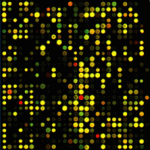Genomics
|
3 april 2018 06:00:12 |
| Whole-genome sequencing of Atacama skeleton shows novel mutations linked with dysplasia [RESEARCH] (Genome Research) |
|
Tweet Over a decade ago, the Atacama humanoid skeleton (Ata) was discovered in the Atacama region of Chile. The Ata specimen carried a strange phenotype—6-in stature, fewer than expected ribs, elongated cranium, and accelerated bone age—leading to speculation that this was a preserved nonhuman primate, human fetus harboring genetic mutations, or even an extraterrestrial. We previously reported that it was human by DNA analysis with an estimated bone age of about 6–8 yr at the time of demise. To determine the possible genetic drivers of the observed morphology, DNA from the specimen was subjected to whole-genome sequencing using the Illumina HiSeq platform with an average 11.5x coverage of 101-bp, paired-end reads. In total, 3,356,569 single nucleotide variations (SNVs) were found as compared to the human reference genome, 518,365 insertions and deletions (indels), and 1047 structural variations (SVs) were detected. Here, we present the detailed whole-genome analysis showing that Ata is a female of human origin, likely of Chilean descent, and its genome harbors mutations in genes (COL1A1, COL2A1, KMT2D, FLNB, ATR, TRIP11, PCNT) previously linked with diseases of small stature, rib anomalies, cranial malformations, premature joint fusion, and osteochondrodysplasia (also known as skeletal dysplasia). Together, these findings provide a molecular characterization of Ata`s peculiar phenotype, which likely results from multiple known and novel putative gene mutations affecting bone development and ossification. |
| 327 viewsCategory: Bioinformatics, Genetics, Genomics |
 A human-specific switch of alternatively spliced AFMID isoforms contributes to TP53 mutations and tumor recurrence in hepatocellular carcinoma [RESEARCH] (Genome Research) A human-specific switch of alternatively spliced AFMID isoforms contributes to TP53 mutations and tumor recurrence in hepatocellular carcinoma [RESEARCH] (Genome Research)Long genes linked to autism spectrum disorders harbor broad enhancer-like chromatin domains [RESEARCH] (Genome Research) 
|
| blog comments powered by Disqus |
MyJournals.org
The latest issues of all your favorite science journals on one page
The latest issues of all your favorite science journals on one page



